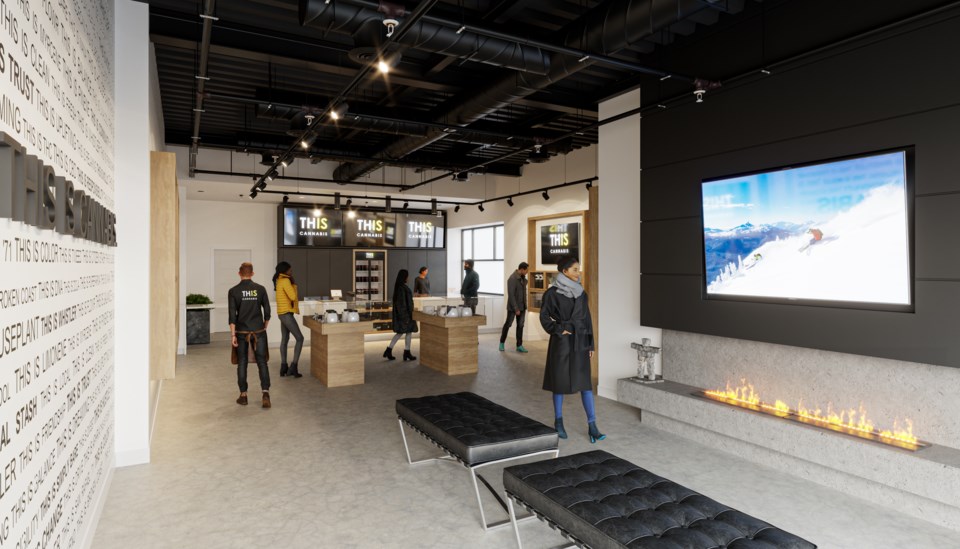They say where there’s smoke, there’s fire, and while the literal smoke is still a ways off, Whistler has its first faint hints of legal weed in the resort, nearly five years since legalization.
According to the Resort Municipality of Whistler (RMOW), nine prospective retailers have applied for one of up to five cannabis retail locations earmarked for the community. (The RMOW indicated there are 10 applications, although one remains partially incomplete. The RMOW’s initial intake period ended in March, however, applications will be accepted on an ongoing basis going forward.)
Under the municipality’s regulatory framework, there will be one shop permitted for each designated area, for a maximum of five in the resort: the Village, Village North, Creekside, Nesters, and Function Junction.
The village, with its built-in foot traffic, was understandably a popular location for retailers, with four of the nine applicants vying for a store there. Two applicants submitted for units in the same building, at 4122 Village Green, while the other village applicants have stores potentially slated for 4294 Mountain Square and 4433 Sundial Place.
The sole Village North submission was for 4368 Main Street, while there were two applications for Creekside, one at 2063 Lake Placid Road, and the other at 2011 Innsbruck Drive. Function Junction also saw two applications, one for 1100 Millar Creek Road and the other for 1050 Millar Creek Road.
Without an application for Nesters, Whistler likely won’t hit the maximum five-store threshold upon the initial rollout of cannabis retail.
“The purpose is to integrate these shops with other retail so we don’t have a concentration of stores in one place, and the stores have the opportunity to succeed,” said Mayor Jack Crompton. “One of the reasons we were patient in the implementation of cannabis retail was watching it happen in other jurisdictions where retail mix wasn’t considered as deeply as we are doing here, which made for unsuccessful stores and also damaged the retail mix of those places.”
This Is Cannabis co-owner Cody Les, who operates cannabis shops in Abbotsford and Chilliwack alongside partner Ryan Bauer, applied for one of the potential village retail stores, and said while it was a lengthy process, he appreciated the care and caution the RMOW employed.
“From the outside looking in, it looks like there are a lot of hoops to jump through. It’s a very long, labour-intensive and capital-intensive process, but the rollout of policies at the RMOW is actually well aligned with what we’ve previously experienced.”
Les particularly appreciated the “geographic equity” the RMOW’s framework offers after watching other jurisdictions flood the market with stores.
“This protects the entire municipality from oversaturation, which has happened in other cities that don’t have these protections for retailers,” he said.
One capital-intensive element of the application process is the fact prospective retailers had to have a property secured in order to meet the province’s guidelines for approval. That meant, in the case of Les and Bauer, they have leased and left vacant the commercial property at 4294 Mountain Square for close to a year.
It was a risk the entrepreneurs were willing to take for the “unique value proposition” Whistler presents as a global destination for millions of visitors a year.
“We considered all the risk and what we thought the timeline would be, which is exactly what it has been, and at that point as a company, you have to decide if you’re willing to take that risk,” Les said. “For us, it was just a decision to say, ‘Hey, let’s go for it and make a statement with This Is Cannabis Whistler.”
Another risk factor the process presents is that, if approved, retailers will operate under three-year temporary-use permits, which adds a layer of protection to the municipality and wider community, but also a level of uncertainty to retailers accustomed to longer leases.
“When you think about the investment in time, energy and notably money in building out a store like this, the prospect of it not being renewed after three, or even six years is a massive risk,” Harrison Stoker, chief growth officer for the Donnelly Group, told Pique last year. Donnelly Group, operators of 16 cannabis stores in B.C. and Ontario, consulted with the RMOW on its final cannabis policy, but ultimately did not submit an application.
Crompton said the shorter permit turnaround, along with the merit-based process that favours applicants who, among other things, provide a living wage and housing to employees, commit to climate leadership and pursuing Whistler’s community health and social strategy goals, and partner with the Lil’wat and/or Squamish First Nations, was developed with the community’s well-being at top of mind.
“This is a brand-new industry that has impact on our community life, and we are committed to ensuring that the impacts are positive,” he said. “We expect that whoever enters the marketplace is going to be a real contributor to this community and we think that what has been installed in the licensing process helps that happen.”
The mayor added that he hopes elected officials will review the retail applications soon, but he had no firm timeline for when that would happen.
Learn more at whistler.ca/CannabisRetail.





